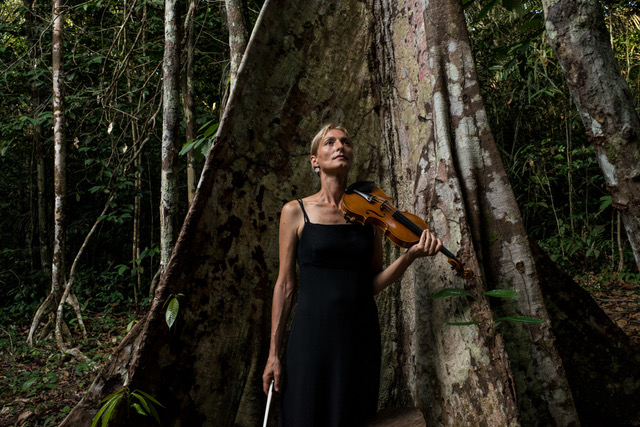20 November 2020
#AGURocks: The Enchantment of Small Things
Posted by Shane Hanlon
#AGURocks is a series of posts by musicians who create science-inspired music and explain their process and inspiration while also showcasing their pieces. Learn more about contributing. The views and lyrics expressed in this post and song do not reflect those of Sharing Science and AGU. This week, Sara Michieletto.

Sara Michieletto, Founder and Director of Emotion for Change project. Credit: Elisabetta Zavoli
Emotion for Change (EfC) was born from an idea of mine, (I’m an established classic musician and an active artist for environmental sustainability and social equality) and brings together a group of musicians, artists and scientists who share the desire to communicate their enchantment and love for the “symphonic” beauty of nature.
A project with which we wish to make people feel and reflect on the future scenarios that the action of human beings is provoking in their relationship with the environment, aware that, as demonstrated by scientific studies, the emotions aroused by music can touch chords of the human soul that scientific communication alone could not make resonate. Scientists such as Luca Mercalli (climatologist and scientific divulger), Georg Umgiesser (first researcher Cnr- Ismar), Fabio Trincardi (director of the Earth System Department – CNR), Amelia De Lazzari (ISMAR researcher – CNR and poet) also collaborates with Emotion for Change. We strongly believe that the desire for care and custody for living beings on Earth, rather than from the fear of climatic catastrophes, can arise from the love for the sublime and harmonious beauty that music and nature have in common. Our music wants to communicate our love for the beauty of nature: the enchantment of the small creatures that live with us, daily.
The musical pieces by “Emotion for Change” are about bees, snails, clouds, leaves, water, ants. The inspiration comes simply by observing with curiosity the little things of everyday life. An example? One day, on the floor of my house, a long row of ants was created, trying to collect bread crumbs and bring them into their lair, behind the skirting board, in a hole in the wall.
We moved the bread crumbs with one finger, and suddenly that neat row turned into a shaky ants’ hullabaloo.
And this is the music that was born: Ants.
One more example? The Italian biologist, Prof. Giuseppe Barbiero, told us about the miracle of life in a… lettuce leaf!
The simple lettuce plant, in fact, contains a lot of Rubisco, an enzyme that fixes carbon: basically it transforms something inanimate into something organic, it manages to create life where there is none! How can you fall in love with it? And here comes a piece dedicated to the miracle of the lettuce leaf, which we are listening in a version for two violins and piano.
Science and music also tell us about the imbalance we are experiencing in our times, when we have forgotten that we human beings are inseparably interconnected with nature, with our bodies, with our breath. Even the fatigue of living together with a living being like the virus COVID 19, could refer to the profound imbalance we have created.
Like in this music, “Acqua che canta”, Singing Water, in which we could feel each single drop of water outside and inside ourselves.


 The Plainspoken Scientist is the science communication blog of AGU’s Sharing Science program. With this blog, we wish to showcase creative and effective science communication via multiple mediums and modes.
The Plainspoken Scientist is the science communication blog of AGU’s Sharing Science program. With this blog, we wish to showcase creative and effective science communication via multiple mediums and modes.